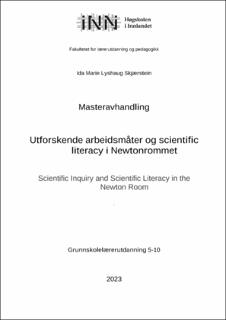Utforskende arbeidsmåter og scientific literacy i Newtonrommet
Master thesis
Permanent lenke
https://hdl.handle.net/11250/3078631Utgivelsesdato
2023Metadata
Vis full innførselSamlinger
Sammendrag
Denne masteroppgaven er en kvalitativ studie som belyser hvordan utforskende arbeidsmåter og scientific literacy kommer til uttrykk gjennom en undervisningsmodul i Newtonrommet og hvordan lærere forstår utforskende arbeidsmåter og scientific literacy. Datamaterialet er innhentet ved bruk av observasjon i et Newtonrom og intervju av to newtonlærere og en faglærer i norsk skole. Alle informantene har naturfaglig bakgrunn. Forskningsspørsmålenes hensikt er å forsøke å besvare forholdet mellom Newtonrommets praksis av utforskende arbeidsmåter og scientific literacy, sett opp mot informantenes forståelse og tanker om de samme begrepene.
Resultatene fra studien viser at Newtonrommets praksis samsvarer svært godt med hvordan informantene tolker utforskende arbeidsmåter, i tillegg til at tolkningen og praksisen er lik det som kommer frem i litteraturen. Når det gjelder scientific literacy tolker informantene dette eksplisitt til naturfagets språk og begreper, og det vies lite tid til reflekterende samtaler for å konsolidere forståelsen i Newtonrommets undervisningsmodul. Praksisen og tolkningen av scientific literacy samsvarer i mindre grad med litteraturen. Tid nevnes som en viktig faktor for det å arbeide med det naturfaglige språket i utforskende arbeidsmåter. Det er derfor rimelig å anta at tidsperspektivet har en stor innvirkning på muligheten for å arbeide med naturvitenskapens egenart gjennom samtaler i utforskende undervisning i Newtonrommet. This master's thesis is a qualitative study that sheds light on how scientific inquiry and scientific literacy are expressed through a teaching module in the Newton room and how teachers understand scientific inquiry and scientific literacy. The data material has been obtained using observation in a Newton room and interviews with two Newton teachers and a subject teacher in a Norwegian school. All of the informants have a nature science background. The purpose of the research questions is to try to answer the relationship between the Newton Room's practice of science inquiry and scientific literacy, compared to the informants' understanding and thoughts about the same concepts.
The results of the study show that the Newton room's practice corresponds very well with how the informants interpret science inquiry, in addition to the interpretation and practice being similar to what emerges in the literature. When it comes to scientific literacy, the informants interpret this explicitly into the language and concepts of science, and little time is devoted to reflective conversations to consolidate understanding in the Newton room teaching module. The practice and interpretation of scientific literacy correspond to a lesser extent with the literature. Time is mentioned as an important factor for working with the language of science in exploratory ways of working. It is therefore reasonable to assume that the time perspective has a major impact on the possibility of working with the uniqueness of natural science through conversations in exploratory teaching in the Newton room.
